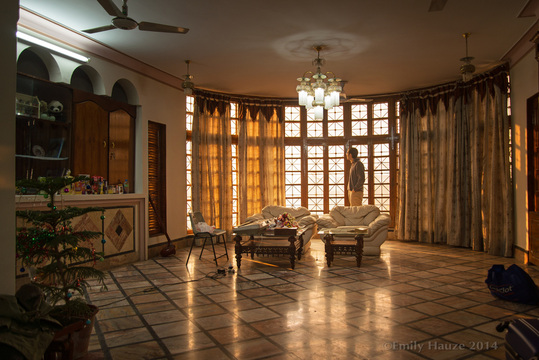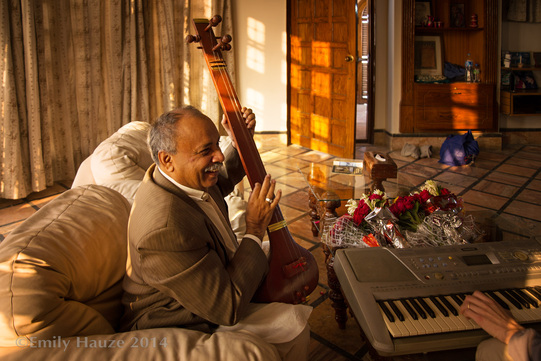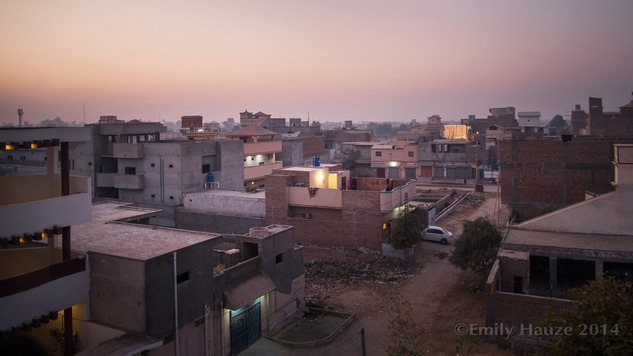|
I wish I had made a sound recording from my first morning waking up in Larkana. Or really from any morning there, as it is always the same -- but on the first morning it was astonishing to me because of its newness. First off there was the rooster, who starts his morning devotional at about 4 AM, though there was nothing especially new to me about that, because of course I have heard roosters often enough in America. Having fallen asleep in a jet-lagged daze quite early the night before, I did start to wake up at the time of the rooster’s first crowings. But I must have dozed off again for a while, because the sound that I really woke up to was the call to prayer. And that was completely and utterly new to me. And how to describe this sound! It was as if the sky itself were waking up, and not in one place, but in many. Not all at exactly the same second, but over the span of a prolonged moment as the different muezzins (cantors) of the different mosques throughout the city approached their loudspeakers. Some were close by, some farther away. All beginning to chant, not together, but with the same purpose, announcing that it was time for fajr, the sunrise prayer. The sound coming from even the closest speakers was hazy to my ears, blurring one Arabic word into the next like wet paint on a canvas. The combined effect was like an out-of-focus panorama, with a few voices standing out vividly in the foreground and many others of all sizes populating the middle and receding into the background. And at this same time it seemed that the city itself was waking up, too. Presumably hundreds or thousands were actually performing their namaz, reciting their fajr prayer. But I observed over my weeks in Sindh that while religion is a constant companion of most Pakistanis, the more obvious rituals (like the performing of prayers, or the attending of mosques on Fridays) are often not strictly observed. At least, not “observed” in the kind of way I am used to as an American who grew up in the Christian church. In my home culture, “church” was a very specific thing, a segregated part of the week, for which you dressed differently, and which, though not unpleasant, was always a bit jarring, a bit out of step with the rest of life. (And that in itself is not a criticism of church--because a change of pace is often a welcome thing, especially with the harried schedules of the Western world.) But what I noticed in the predominantly Islamic space of Sindh was a presence of religion that was far more fluid in people’s lives, and yet in a strange way, less intrusive. This is a big topic worthy of much deeper consideration, and already I am tempted to go on a tangent that would keep us from starting my day in Larkana for many paragraphs to come. But I will save those thoughts for a later entry, and for now finish off this soundscape that I am trying to create. The morning chanting came from every direction, a warm and enlivening sound, and it occurred to me that many people (not only here but all over the Muslim world) must have heard these sounds either in their morning slumbers or upon awakening for every day of their lives. The only comparable sound in the Christian culture is church bells, which do serve a similar purpose, if one happens to live close enough to a church to hear the bells, and if the bells are still in working order. Perhaps centuries ago one would have been able to hear a collage of church bells in the morning, coming from multiple churches in a town, covering the same kind of aural space as these many chantings of muezzins. But even then the sound would have a different quality, because what I was hearing this morning in Larkana was of course not just music but voices. And as they drew near to the end of their chants, it seemed that many other sounds had awoken as well. It was as if all the wheels of the city were slowly spinning into motion. Things began to whir and grind and clatter. Traces of laughter and conversation and calling and murmuring seemed to mix in. And the sounds of many animals, moving about, bleating and neighing, tweeting and chirping. The sound of papa Saeed’s peahen, a magnificent honk, punctuating the air at various intervals. All this seemed to come to life, around 6 AM, on that morning. A Sindhi morning--just like any other, but my first. Once awake, I was better able to take in my immediate surroundings than I had been the previous night in my sleepiness. Papa Saeed had placed us in the biggest bedroom of the house -- a room that takes up the whole third floor of his large house. This room had originally been the master suite, we learned later, but Papa and Ammi had moved themselves to the first-floor bedroom when Ammi’s sciatica had started making stair-climbing unpleasant. When they moved out of that room, my second sister Moomal moved in -- but we actually were not told this until much later, because no one wanted us to worry that we were displacing Moomal from her room. We were under the impression that this was a guest suite now.  Our room in the Sangi house. Note the Christmas tree at the left. Our room in the Sangi house. Note the Christmas tree at the left. And what a suite it was! An enormous bed and vanity and wardrobe occupied only about a third of the space, next to the bathroom, which we also had to ourselves. The rest of the expanse was all open, big enough for two other rooms. Two plush armchairs and a coffee table rested in the other far end, nearer to the door, close to the curved wall of windows. Papa had himself designed this house and had it built to his own specifications (something he shares in common with my American dad, who designed his own house too), but I had assumed upon first seeing this mansion that it must be quite old, because it seems a classic, and its materials are so fine. The defining feature of the Sangi house is a cylindrical portion at the back which extends up all three floors, and is plated with windows all the way up. They are cleverly designed one-way mirror windows, so that light reflects from them (useful especially in the sweltering Larkana summers), and no one can see in from outside. One whole wall of our bedroom suite was part of this curved window structure. The previous night, as we were getting settled, all our belongings were brought up to us by a series of people, some of them servants, some of them new cousins and brothers, some of them we wouldn’t ever be able to identify. Our six bouquets of roses had been stacked on the coffee table. An electric keyboard had been left on a chair for Andrew (who is a musician), as well as a tamboora (see previous entry for explanation of that), which Papa had found somewhere or other. We had also been brought a tray with dishes of pasta in the evening, which had amazed us, because we were not used to being served food in our room. But that turned out to be only a minor surprise compared to what awaited us in the morning. Papa Saeed, before going to sleep, perhaps at 2 AM after the wanwah celebration, had sent us a text message saying that he knew we would likely wake very early, so we would find breakfast outside our room. And there indeed, to our amazement, was another tray and a huge assortment of items that had been gathered for us. A loaf of bread, a toaster, some apple jelly, two teacups and saucers and spoons, teabags and instant coffee, a carton of Nestle milk, an electric water boiler, packages of biscuits (cookies, in American terminology), and probably more things that I can’t remember. All this had been left for us as we slept through the party we were supposed to be attending, so that we would not be hungry or experience any discomfort at all in the morning. Remembering this, I feel the same warm emotions welling up in me that I had that first day, and that I continued to have throughout my time in Sindh. So much care was given to us at each moment -- so much love in everything. I hope I can convey to all my readers how special this is. By the way, this first morning in Larkana also happened to be Christmas morning. And it is the only Christmas I have spent away from my home country, though I was not too sentimental about that. Still my Sangi family were sensitive to it, and had not forgotten our holiday. My youngest sister, Mehak, and her fiancé, Daniyal, had decorated our room for us. Outside the door, in the hallway, they had pinned up a glittery garland to spell out MERRY CHRISTMAS in large red and green letters. Inside they had placed a small potted tree, some sort of conifer, which was decorated with lights and Christmas ornaments. (Later in the day, several of our younger new cousins came up to the room and sang some Christmas carols with us. They all knew the chorus of “We Wish You a Merry Christmas” and sang it with great gusto. We sang the verses for them, and explained how it is mostly about demanding free food, and they laughed with us and sang some more.)  Papa Saeed and tamboora on our first morning in Larkana. Papa Saeed and tamboora on our first morning in Larkana. So Andrew and I enjoyed our tea and breakfast that Christmas morning in the sunlight from the curved windows and the blinking lights of our little Christmas tree and the fragrance still emanating from all our rose bouquets. We sent Papa a text to let him know that we were awake, because he had also requested that. But we figured he would need to sleep a while longer, having partied so late the night before. Soon after this, however, we got a knock on the door, and there was Papa. I gave him a hug and apologized again for not coming to last night’s party. It was clear that we had been missed, and many people had asked about us, but Papa did not make us feel bad. He said he knew that if we had gone to sleep there was no way we would get back up for the party. And he giggled his patented, world-brightening giggle. And all was well. “Come on, I take you on a tour of my house,” he said. And then he quickly corrected himself, “YOUR house, Sweet EM, and yours too, Andrew, son-in-law.” We followed him through the hallways of this airy house, which was still new to us, but which would soon feel like we had spent our lives there. Papa’s posture was that of a classic South Asian lord-of-the-manor: his chin high, his hands linked behind his back except when gesticulating towards his various rooms and possessions. And we observed with due admiration the home that he has built for himself over the past decades, all the product of his own merit and hard work. Now, I don’t know if the Sangis themselves would consider their home to be all that big or grand, compared to others of the same status. Because Sindhi families tend to be large and close-knit, it is not uncommon for homes to be big and accommodate many people, and it is common for families of the middle class and higher to have servants. (More about servants in a later entry, since that is one of the very big cultural differences between America and Sindh.) But to us, it certainly seemed so. Despite the spaciousness of the house, though, it soon became clear to us that not everyone had the kind of kingly accommodations that we had been given. In fact, all the other bedrooms seemed to be packed with people, at least two each, and in many cases it seemed there were more like four or five, some sleeping in beds, some on couches, and some on the floor. It was probably 8 AM at this time, and apart from us and a couple of servants, the whole house was still asleep. Andrew and I would of course have happily waited to have our tour of the house when people were awake, not wanting to disturb them, but Papa was unconcerned. He ceremoniously opened each bedroom door, most of them creaking audibly under his hand, and described each scene in his uncontrollably booming voice: “THERE - PEOPLE SLEEPING ……. AND HERE…. MORE PEOPLE SLEEPING….” (Those who know Papa only via his Facebook profile will be pleased to learn that his characteristic all-capital style of typing suits not only his giant personality, but also his voice, which is deep and resounding even when he tries to speak softly.) In each room we peeked in dutifully, but also tried to minimize the disturbance of the sleeping relatives by urging Papa back out into the hallway. “OKAY,” he said, smiling, “YOU WANT TO GO SEE LARKANA?” And we agreed that this was a wiser plan. But this blog entry has already reached a substantial length, so I shall pause here. The next entry will share with you what we saw on that morning in Larkana, and the mehandi celebrations later in the day. Countless stories are still waiting to be told.
14 Comments
1/26/2015 02:02:54 am
Although this part of your Travelogue or largest part of it, contains the introduction of your Pappa (Dr.Saeed)`s house and details of the environment,where you spent your first night. has a very pleasant narrative of description. And the first paragraph narrating the sounds of cock roosters, the sound of Azan and a bit of comparison between American and Sindhi culture is quite interesting and very well written. One thing, that I am assured of now is that your writing skill has the power to carry the reader with you. Its fantastic. Simple and impressive.Waiting for the next part, which might contain the narrative of the account of Marriage function(s). Wish you and Andrew all the best.
Reply
Emily
1/26/2015 05:37:51 am
So grateful, dear Babar, for your generous words. You are a great encouragement.
Reply
dr abdul ghafoor magsi neurologist
1/26/2015 02:30:51 am
quite wonderful experience u had ....and beautiful way writing down about all this....so nice it is.........
Reply
Emily
1/26/2015 05:38:20 am
Thank you dear Abdul! I'm very glad you are taking the time to read my blog.
Reply
naz sahiti
1/26/2015 03:43:03 am
Good.intresting
Reply
Emily
1/26/2015 05:38:38 am
Thanks dear Naz!
Reply
Margaret Krantz
1/26/2015 06:56:23 am
You have such a lovely, evocative narrative style, Emily. It is very fun for me to read about how kind people were to you. How thoughtful the Christmas decorations were and how beautiful the room! I spent my 23rd Christmas in the Philippines, and was so lonely....I'm glad the same was not true for you.
Reply
Khalid Baloch
1/26/2015 08:20:08 am
wow it is really touchy thank you Emily
Reply
Dr Razaque Rajpar
1/26/2015 11:07:46 am
Intresting and memorable story.
Reply
1/26/2015 11:16:01 am
Very much nice and indeed inspirational mod of writing that when someone goes through and feel new spirit to live a happy life.
Reply
Asad Hussain
1/26/2015 08:34:41 pm
Dear Emily, You have a different way of expression because you look and observe the things differently. No doubt, this blog is very interesting for every Larkanian as well as for every Sindhi.
Reply
SURHIO RAFIQ
1/27/2015 01:48:53 am
AN AMERICAN GIRL LOVELY EMILY WITH HER LOVELY EMOTIONS ABOUT SINDH,MAY ALMIGHTY ALLAH KEPT IT BEAUTIFUL AS IT IS AND SAVE OUR MOTHERLAND FROM ENEMIES,THANKS EMILY TO VISIT SINDH AND ENJOY A LOT
Reply
Zafar ali khuwaja
1/27/2015 06:05:38 pm
having read your 4 parts of travelog it is now difficult to decide whether you are a better photographer or writer.... at the moment both skills are classically equal! Thumbs up Emily Hauze! Keep up dear.
Reply
Zafar Ali Khuwaja
1/27/2015 06:21:54 pm
I am sure they had served you a desi sindhi nashta (breakfast) sometime during ur stay out there! I'd like to have ur comments on it too! Secondly you rarely mentioned feelings of Andrew about that trip, hope you ll include them in next parts!
Reply
Leave a Reply. |
Image at top left is a digital
portrait by Pakistani artist Imran Zaib, based on one of my own photographic self-portraits in Thari dress. AuthorCurious mind. Archives
September 2020
Categories |
emily s. hauze

 RSS Feed
RSS Feed
